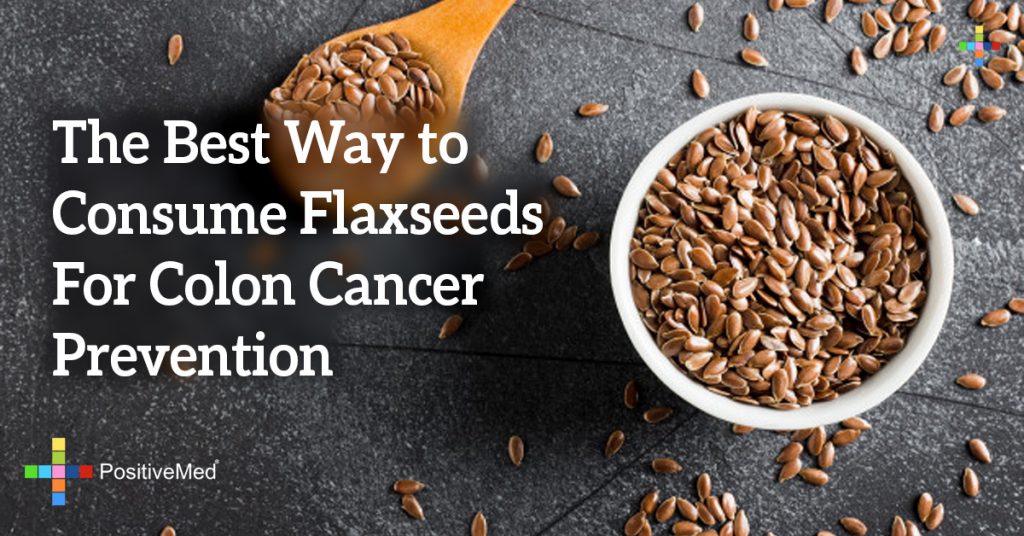
The Best Way to Consume Flaxseeds For Colon Cancer Prevention
Each year, more than 100,000 Americans are diagnosed with colon cancer. This cancer occurs in the large intestine where it develops from untreated or misdiagnosed polyps into tumors. People who suffer from Crohn’s disease, ulcerative colitis, and ovarian or uterine cancer — along with obese persons, alcoholics, smokers and tobacco users — are more susceptible to colon cancer than those who are free of those conditions.You can start consuming flaxseeds to prevent colon cancer:

Cancer is a breakout of mutating cells that the body’s defenses cannot overpower. Cancerous cells are like weeds in a garden: they draw water, nutrients, oxygen and space from their healthy counterparts to increase their mass and strength. When these cells multiply and become a threat, a full-blown disease is born. Symptoms of colon cancer include bloody stools — often erroneously attributed to hemorrhoids — or very thin stools, fatigue, weight loss and persistent nausea.
Anti-Cancer Diet
Diet is routinely brought up with regard to colon cancer. A high-fiber diet is believed to be one of the best factors in preventing colorectal cancer. The reason for this is simple: soluble fiber expands and moves stool through the colon and out of the body. Waste material that is ejected from the body removes impurities that otherwise do harm by sticking around.
RELATED ARTICLE: 8 Colon Cancer Food Fighters
The Secret in the Flax
For centuries, flax has been used as a herb and a medicine by various cultures, mainly as a laxative. Flaxseed is derived from the flax plant. It is a phytonutrient — Phyto means plant-based — as well as a natural antioxidant and anti-inflammatory. Studies show that omega-3 fatty acids— of which flaxseed is one of the best sources — are beneficial to prevent colon cancer and heart disease.
Flax expands with the addition of water, hence its role in healthy colon maintenance. The latter quality is due to its omega-3 content, specifically alpha-linolenic acid (ALA). ALA plays a crucial role in supporting healthy cholesterol levels — it helps keep HDL up and LDL down. The compounds in flax called lignans are perhaps its greatest benefit. Lignans reduce the likelihood of carcinogenesis, the creation of tumors, by more than fifty percent.
How to Take Flaxseed and Flaxseed Oil
To reap the benefits of the seeds, crush them with a coffee grinder and take them with a lot of water. The stomach is unable to break down whole seeds and they will pass through the GI tract intact. Ground-up flaxseed should be used within 24 hours or they lose much of their potency. It’s best to only grind as much as you need at one time. It should be noted that the body will treat unripe seeds like a toxin.
Mylar-cased pre-crushed flaxseed can be purchased at specialty stores along with other bioavailable forms like capsules, powders, and linseed cakes. Adults should imbibe the seeds in sensible doses — two tablespoons is a typical dose — while a doctor or specialist should be consulted on doses for children 12 and under.
RELATED ARTICLE: What You Should Know About Colon Cancer
Flaxseed oil is a distillate that contains the ALA minus the fiber. It’s a convenient way to take advantage of the flax’s benefits. It must be kept refrigerated. The oil contains greater amounts of omega-3 fatty acids, but it gets more calories per serving. It lacks the seeds’ fiber, too. Oil also lacks the minerals in the seeds like copper, magnesium, phosphorus and zinc.
One More Flax Tip
For an effective colon cleanse, combine crushed flaxseed with kefir, a fermented drink made from milk, beneficial bacteria, and yeast. One tablespoon of seeds taken with a glass of kefir one-third full, for one week is the recommended dose. Kefir has no ill effect on lactose intolerant individuals because the bacteria process most of the lactose. Kefir is also made with coconut water and almond milk if it’s a concern. This mixture does not count towards the recommended daily intake of eight glasses of water for everybody.





